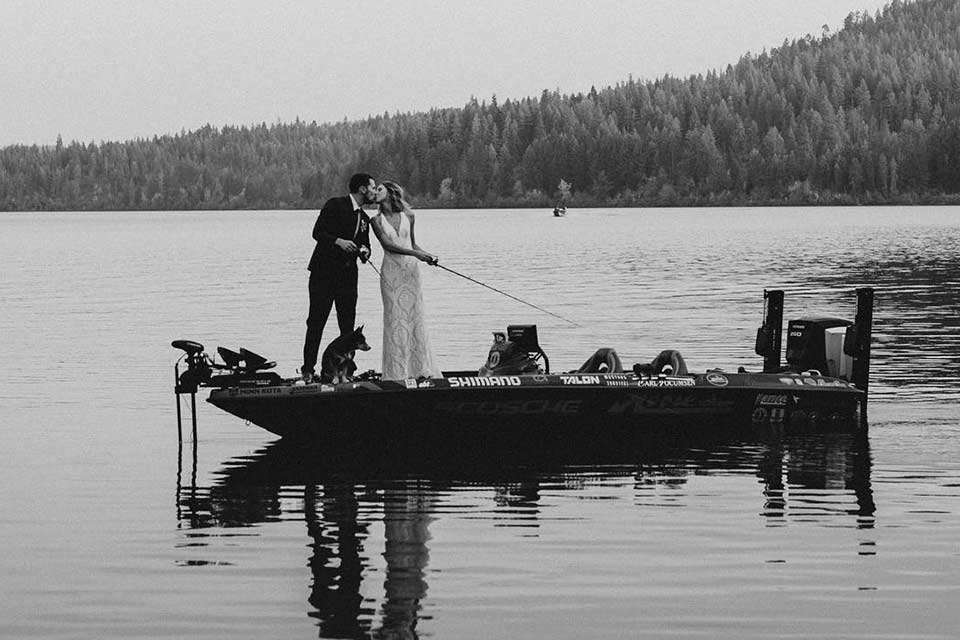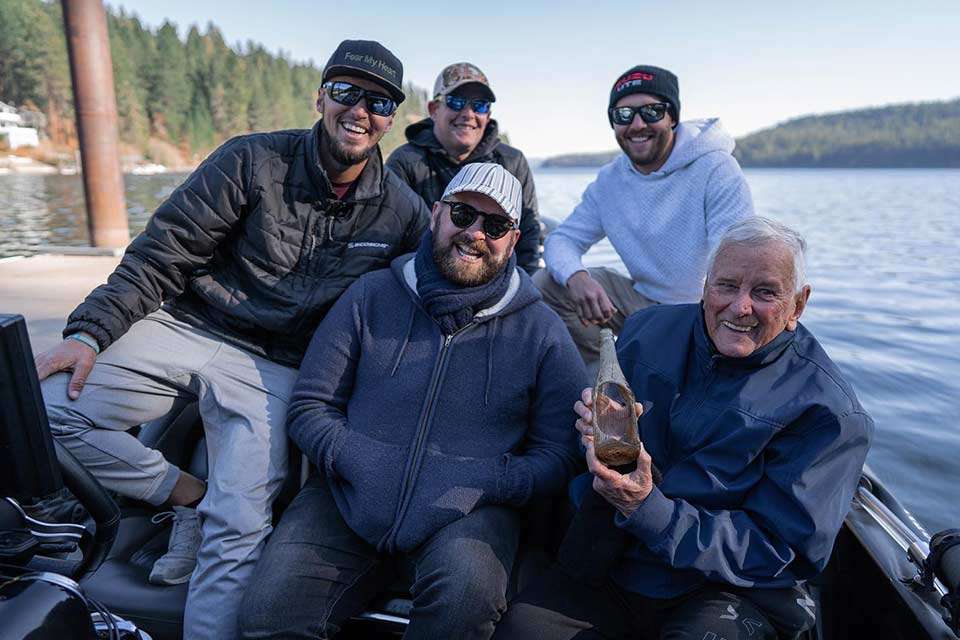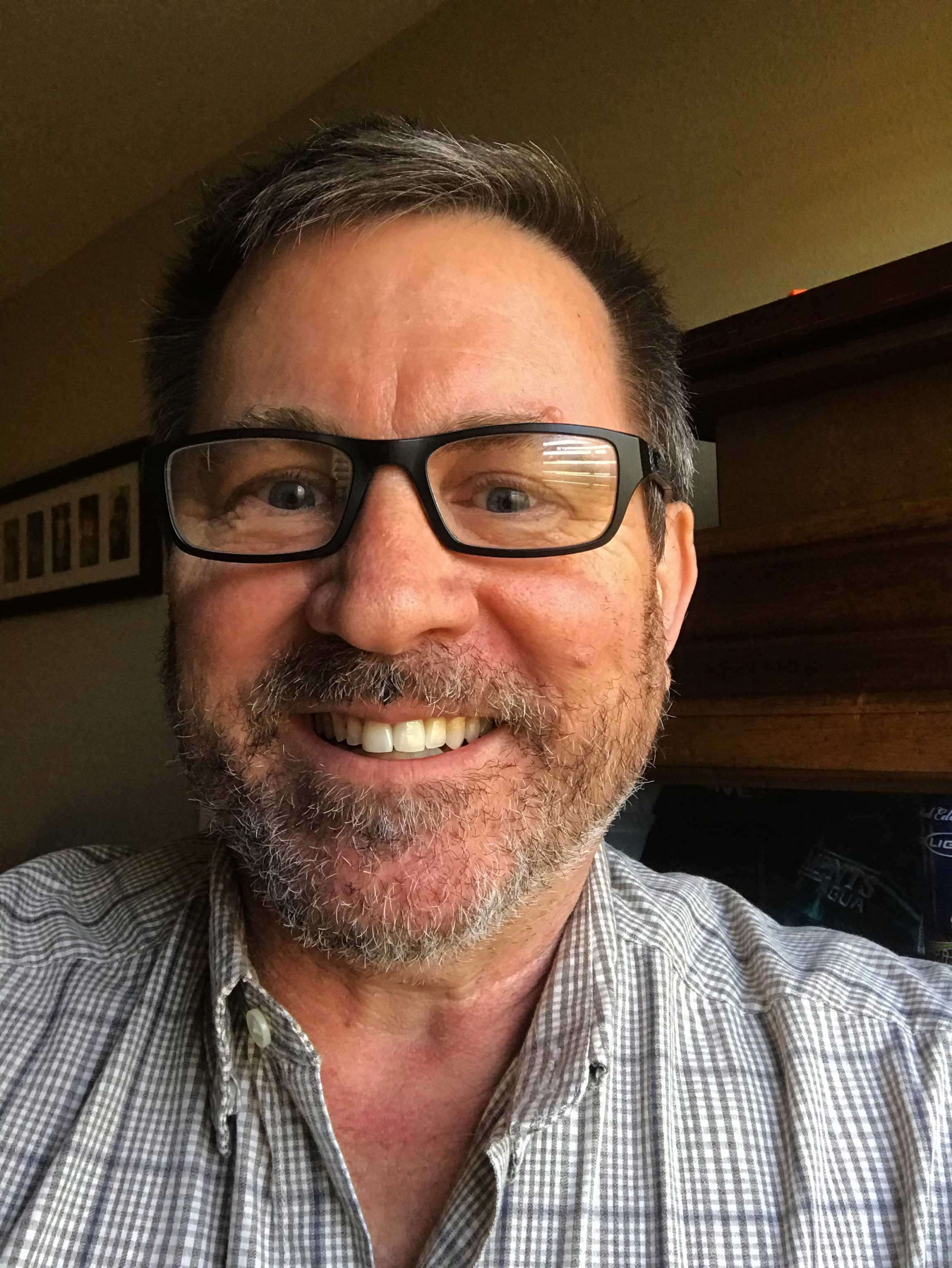
Now that Australian Carl Jocumsen has married an American, one would believe he’s good to continue competing in the country.
Wrong.
Jocumsen said there’s still loads of paperwork required for him to fish on the Bassmaster Elite Series. Jocumsen and Kayla Palaniuk married this week near her Idaho home, just weeks after Carl rallied on Day 4 to win the Cherokee Casino at Tahlequah Bassmaster Elite at Lake Tenkiller on his 35th birthday.
At the JM Associates studio to shoot his segment of Winning Ways, Jocumsen explained there are plenty of hoops to jump through for an international angler. He’s had to fill out stacks of paperwork and spent thousands just to attempt his dream.
“The first year I was over here, I flew back and forth four times in one year,” he said. “After 89 days, I could leave on the 90th day, fly home, I’d be home for two or three days and fly back. I think I spent $10,000 in flights.”
With winning the Australian Bass Fishing Championship about a decade ago, Jocumsen earned an expenses-paid trip to compete as a co-angler in the U.S. Open on Lake Mead. His success and relationships developed fueled his fire to compete here full-time. That first year was tough, but some great fortune fell his way the next year.
A friend introduced him to an American who needed a hunting guide in the middle of Queensland, Australia, which Jocumsen described as “hard country, desert, kangaroos, pigs.”
“I was home and this guy put me on to him to take hunting,” Jocumsen said. “It was flooding and he couldn’t get anywhere. He went hunting and we had a blast. He was like, ‘Anything that you want, you let me know.’”
Grasping the opportunity, Jocumsen sent him an email a couple weeks later asking for help to obtain a U.S. visa. The man sent him on the right path of a sporting, or P1 visa, which allows aliens to perform at a specific athletic competition. But it required filling out about a 2-inch thick set of documents, he said.
“I had to get a visa attorney, and he basically did all that. It’s like what a golfer would get,” Jocumsen said. “That cost $7,000 for three years. They went like that, and it was over. I did it again, and that ran out and I did it again. I spent $22,000 to live here and earn money legally for the last eight years. It ends at the end of next year.”
Now married to an American citizen, the paperwork isn’t over. Jocumsen must adjust his status. He hopes for permanent residency to receive the benefits of living and working in the U.S. while retaining citizenship in Australia.
“I think I can get a green card or get dual citizenship, which would allow me to earn money in both countries and fly in and out when I needed to,” he said. “That would be the best scenario. It’s not a matter of just getting married.”

A green card, or Permanent Residence Card, would give him the rights, benefits and privileges of living in the U.S., and he’s hopeful. He related scary stories about dealing with attorneys, the American consulate in Australia and U.S. Customs and Border Protection agents.
“They want to know everything,” he said. “The attorney says fix this page, find this employer, this amount of money, more evidence that you’re here for the right reasons. The reason the sporting visa is good is it doesn’t take a job off another American.”
There are a lot of I’s to dot and T’s to cross, and Jocumsen said he saw that firsthand at the U.S. consulate in Sydney, Australia.
“This year, I went in there and the people in front of me, I could tell they didn’t do it like I did it,” he said. “They went to the window for a final interview, and they got turned away. People were crying.
“My heart was racing. My whole fate is me walking up to this window, they look at it, talk to you, and they could just say, ‘No, not at this time, sorry.’ Just stamp it no. That’s what they said to these people.”
He even had a lot of explaining exactly what he would be doing in America. The work description of “pro bass fisherman” on the forms turned plenty of heads, and he even had to show some photos of him competing.
“The scariest is the border security when you’re coming in,” he said. “They look at your visa, look at everything and they’re like, ‘Why are you coming into America?’ – ‘I fish for bass.’
“When you fly into LA, they never heard of it. They just give you questions. But in Texas, ‘I’m a bass fisherman,’ and they’re like ‘Oh, where do you fish?’”
Pros from Japan have competed in the U.S. for years, with Norio Tanabe becoming the first international angler to win a Bassmaster event in 1993. While a wave of Japanese winners followed, Jocumsen is the first from another country to record a victory in B.A.S.S. (He even said some Japanese anglers have asked him about how best to get the sporting visa.)
Jocumsen said he might have just opened the door for more Australians to compete in America. Fellow countryman Dean Silvester of Boonah, less than two hours from Jocumsen’s birthplace of Toowoomba, has fished Basspro.com Opens for the past two years, taking a high of second place at Oneida Lake last month.
“There are a lot of good fisherman and more will start to come over,” Jocumsen said. “Aussies will say, ‘I can do it now.’ Before I did it, everyone was like, ‘No way, it’s never been done.’ I wouldn’t be surprised in the next five years or more we have couple more Aussies make it to the Elites.
“And I want to help the guys come over, because there’s all those brick walls that I ran into. I just did everything wrong. I was just going down this path leading to nowhere. You have to learn from that and backtrack and go again.”

